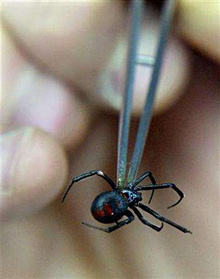 |
 |
 |
 Editorials | Issues | June 2007 Editorials | Issues | June 2007  
US House Votes to Lift Ban on Overseas Contraceptive Aid
 Anne Flaherty - Associated Press Anne Flaherty - Associated Press
go to original


| | A Chilean scientist shows a black-widow spider at his laboratory in this file photo. Scientists have discovered a potentially marketable contraceptive in the venom of Chile's black widow spider, whose bite is fatal to many but can also cause prolonged, painful and involuntary erections in men. (Reuters/Carlos Barria) |
Washington – The House voted narrowly Thursday to reverse a ban on contraception aid to groups overseas that offer abortions, a pillar of President Bush's foreign aid policy.

Bush is likely to swiftly veto the proposal and be upheld by conservative lawmakers who say no assistance of any kind should be given to organizations that promote or offer abortions.

The measure, approved 223-201, is intended by the new Democratic majority to crack open debate on a policy it says is failing badly. Initiated by President Reagan in 1984 at a population conference in Mexico City, the policy bars any assistance to organizations abroad that perform or promote abortion as a method of family planning.

Democrats say an unintended consequence is an alarming shortage of contraceptives, particularly in poor rural areas.

The bill would help "reduce unintended and high-risk pregnancies and abortions ... and save the lives of mothers," said U.S. Rep. Nita Lowey, D-N.Y., who chairs the House appropriations panel that oversees the foreign aid budget.

"It is simply not enough to say you support family planning, so long as the current restrictions remain in law," Lowey said.

The House voted to attach the measure to a $34.2 billion bill that pays for State Department operations and foreign aid in 2008.

Lowey initially drafted legislation in such a way that would have guaranteed funds to any group so long as the assistance included funding for contraceptives.

Facing stiff opposition to the plan, Lowey drafted the amendment that passed to restrict the aid to U.S.-donated contraceptives.

Republicans still bristled at the proposal because they said the donation would free up resources for groups to provide abortions. They also said it would undermine the intention of the Mexico City policy, which is intended to pressure organizations to abandon abortion services.

"The Mexico policy exists to draw a bright line between U.S. family planning policy and abortion," said U.S. Rep. Joe Pitts, R-Pa. "However, it appears that there are some out there who wish to blur this line, (which) is what leads to coercive abortions and forced sterilizations."

Smith and Bart Stupak, D-Mich., proposed alternative legislation intended to reinforce the existing policy. That was rejected 218-205. While Republicans were doubtful they had enough votes to pass Smith's measure, they were confident they could sustain a presidential veto.

"If we provide either cash or in-kind contributions or anything of value to pro-abortion organizations in other countries, we empower, enrich and enable them to expand abortion," said U.S. Rep. Christopher Smith, R-N.J.

In a statement released Tuesday, the administration said the president would veto any legislation "that weakens current federal policies and laws on abortion."

Democrats say statistics show sexually transmitted infections and abortions are on the rise in areas where U.S. contraceptive assistance is unavailable. According to Population Action International, which supports the Democratic bill, Ghana's rates rose after a prominent family planning group in the country was denied U.S. assistance.

Bush policy has had a destabilizing impact on country-led family planning programs and undermined decades of health care provision by leading national non-governmental organizations, the group says.

The funding bill attracted a slew of other amendments on foreign affairs. The House voted 355-69 to restart the Iraq Study Group to conduct another assessment of the war.

It also adopted by voice vote a proposal by U.S. Rep. Ileana Ros-Lehtinen, R-Fla., to redirect $20 million initially intended for the U.N. development program, under fire for its aid to North Korea. The House also was on track to adopt a measure to restrict money for the U.N. Human Rights Council.

Ros-Lehtinen said the votes are evidence of "palpable bipartisan frustration with the slow pace of U.N. reform and the alarming deterioration of the U.N.'s commitment to protect human rights around the world." | 
 | |
 |



